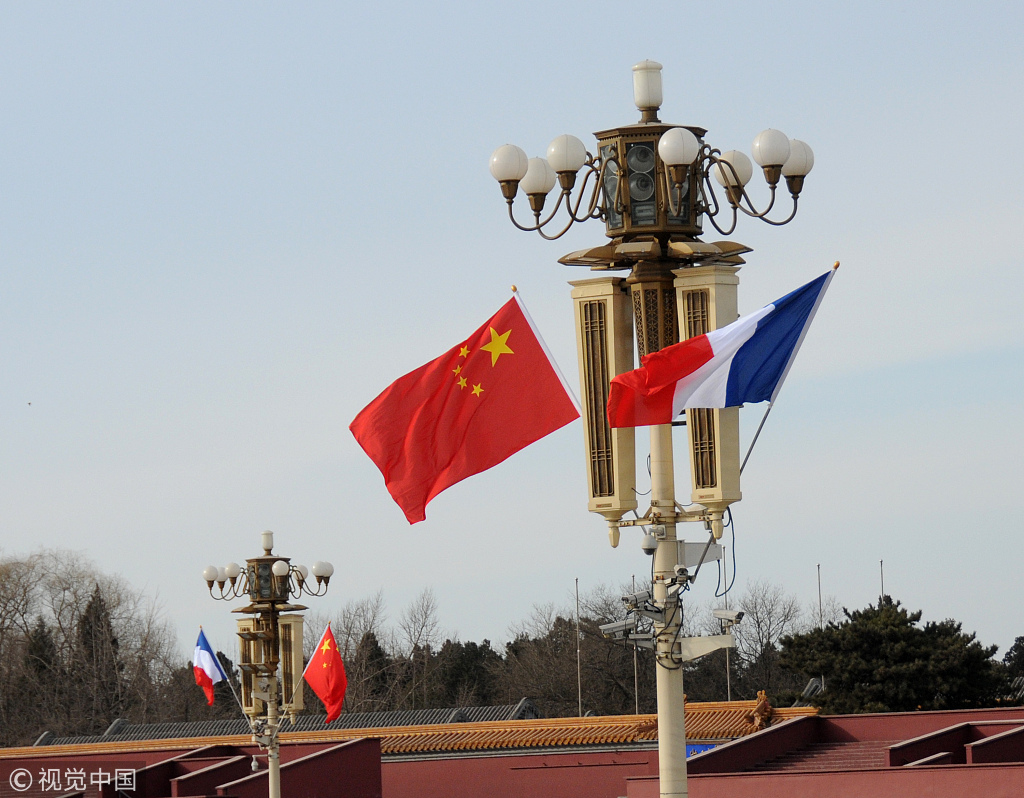Sino-French relations help build global future
By David Gosset | China Daily | Updated: 2019-01-28 09:06

France and China demonstrate that Western modernity is compatible with Chinese modernity; they contradict the narrative of the inevitability of war; they are at the avant-garde to cobuild a community of shared future for mankind.
It is a long course of events shaped by men of vision, and it is the convergence of efforts toward a better civilization that explain the profound friendship connecting the two countries beyond the passage of time.
A statement attributed to Napoleon Bonaparte (1769-1821) that he probably never uttered but has become an inept cliche goes: "When China wakes, the world will shake."
In a news conference on Sept 9, 1965, former French president Charles de Gaulle did present a more nuanced view: "A fact of considerable significance is at work and is reshaping the world: China's very deep transformation puts her in a position to have a global leading role."
Time has confirmed de Gaulle's prediction: The Chinese renaissance has modified the world's distribution of power in a gradual and peaceful process without any abrupt discontinuity or violent disruption.
Sunday marked the 55th anniversary of the establishment of diplomatic relations between France and the People's Republic of China. From a French perspective, the full recognition of the Beijing government was, above all, the decision of one man-de Gaulle, one of France's greatest statesmen and a colossus of 20th century world politics.
His acumen and strategic thinking were not only at the origin of a special relationship between Paris and Beijing, but the spirit of his groundbreaking decision remains a point of reference for the future of Sino-French cooperation.
From the majestic but distant relations between the Emperor Kangxi (1654-1722) and King Louis XIV (1638-1715), to the collaboration between Zuo Zongtang (1812-1885) and Prosper Giquel (1835-1886), or the action in the field of education by Li Shizeng (1881-1973) and Edouard Herriot (1872-1957), Chinese Francophiles always responded to the call of French Sinophiles.
The world has changed significantly in the past five decades, but the mutations did not radically affect the relevance of Gaullism, which is, in its highest expression, the effort to act according to permanent realities.
De Gaulle thought and acted under the light of la grandeur, a notion that is at the heart of France's national character. The relative weight of the French power varies, and it has certainly been diminishing by comparison with the Chinese re-emergence, but the self-perception of the singular role it has to play is constant.
China, which has seen through the millennia a prodigious process of synthesis unifying one-fifth of mankind, will go on to apply her harmonizing force at a global level.
Animated by a conscious effort of radiation, or rayonnement, France aims to federate around what she conceives and enunciates as an enlightening project. By contrast, China's impact is by gravitation-the "Middle Country" coheres around its demographic mass and the continuity of its civilization.
Having the highest self-image, the Chinese and the French are, taken collectively, especially sensitive to the variations of fortune and, when the inevitable vicissitudes of history reduce the grandeur or the centrality to a mere nostalgic representation, the sentiment of loss can be for them more acute than for other political bodies.
Beyond the contingent parameters of the Sino-French relations, transient administrations or political-economic conditions, Paris and Beijing, concerned by the destiny of mankind, will always find it necessary to articulate an explicit grandeur and an implicit centrality.
In the 21st century they have to coordinate the "China Dream" of renaissance and what the former French foreign minister Laurent Fabius named in reference to his country puissance d'influence, or "influential power".
Ironically, the gap between France's representation of herself and the weight of her relative power is widening and, therefore, contrasts with the Chinese centrality that is increasingly effective.
However, the global evolution won't erase the rich French heritage nor the French contribution to the making of Europe, and, more generally, it is precisely in the middle of the most challenging circumstances that the idea of grandeur itself can re-energize the country.
The synergies between centrality and grandeur are more than the affirmation of two separate political identities. They are impulsions for the new humanism of a global renaissance, connections between East and West as much as North and South; they are concrete universalism.
The author is founder of the Europe-China Forum. He is the author of Limited Views on the Chinese Renaissance. The views do not necessarily reflect those of China Daily.
























